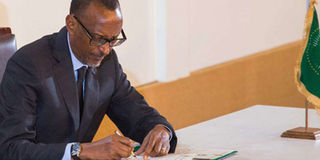Cautious optimism needed for success of Free Trade Area pact

African Union Chairperson Paul Kagame signs an agreement for establishing the African Continental Free Trade Area during the African Union Summit in Kigali, Rwanda, on March 21, 2018. PHOTO | AFP
What you need to know:
- It is a milestone because many other decisions of the AU have remained work in progress long after being agreed on.
- The economic consideration is tied closely with political ones, making the establishment of the trade a dicey political-economic headache.
The signing of the African Continental Free Trade Area (AfCFTA) agreement by African leaders this week in Kigali calls for cautious optimism for the continent’s socio-economic fortunes.
It is a significant achievement because it has taken six years – a relatively short duration – for the African Union decision of 2012 to come to fruition, albeit one year late.
In essence, a free trade area will mean a single African market marked by the seamless mobility of people, goods and services across the continent, unencumbered by high tariff and non-tariff barriers.
It is a milestone because many other decisions of the AU have remained work in progress long after being agreed on.
ECONOMIC GROWTH
The feat reclines on the fact that in the days leading to the AU summit in Kigali; it seemed likely that the deal would falter on the back of African nations doing a volte-face.
On Wednesday, 44 nations, constituting well over half the nations, affirmed the agreement.
It is cause for celebration as the envisaged movement of goods and services across the world’s second largest landmass with a population of 1.2 billion and a combined GDP of more than US$3.4 trillion has potential to unleash an economic renaissance.
The trade area would boost intra-African trade, which currently stands at a meagre 13 per cent of the continent’s total trade, ensuring that the continent benefits from trading with itself rather than greatly relying on the outside.
RATIFY
In other words, the African free trade area is on the cusp of becoming the largest anywhere in the world.
The heft alone would unleash if not infuse positive energy for a continent often derided for lack of self-confidence.
Bullish optimism must however be tempered with hard-nosed prudence.
The agreement still needs to be ratified by individual nations in line with national laws and regulations.
This is where the rubber will meet the road. Alignment of crucial factors such as trade policies, productive capacities, market integration and financing will be a hard nut to crack.
For a 54-nation region marked by mashups in legal and policy architectures as well as economic and population metrics, it can take ages for a trade area to get off the ground.
NIGERIA OUT
Consider, for instance, the fact that all African Regional Economic Communities – the East African Community comes to mind – have missed most deadlines for harmonization of trade and economic regulations!
Pessimism should be entertained because Nigerian president Muhammadu Buhari, leader of the continent’s giant in political economy terms, turned away from the deal.
Ostensibly Buhari elected for a no-show in Kigali at the very last minute at the behest of Nigerian corporates worried that their enterprises will suffer under a liberal continental trade regime.
While it was expected that the continent’s qualitative economic power, South Africa, might equally abstain, newly elected President Cyril Ramaphosa was on hand to sign on the dotted line.
However, one cannot wish away some players in the South African economy who, like their Nigerian counterparts, might question the equalizing impact of a deal that might run counter to their interests.
INTERESTS
Indeed, there are signs that a number of countries and businesses will be hedging against involvement in the free trade area if the deal affects their trade sovereignty and bottom lines.
The economic consideration is tied closely with political ones, making the establishment of the trade a dicey political-economic headache.
Certain African leaders and nations will support the trade area ideal only if it serves their direct and national interests.
Perhaps even dicier is the fact that powerful global players might want to retain Africa as a market for their finished products rather than encourage an Africa that trades with itself.
The factors ranged against the continental market are many and intricate.
But Africans should not throw their hands in the air in utter defeat.
Cautious optimism calls for enhancing strengths while hedging against weak links.
The writer is a lecturer at University of the Witwatersrand, [email protected]




